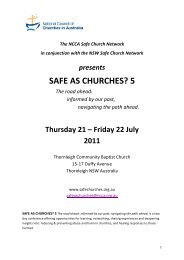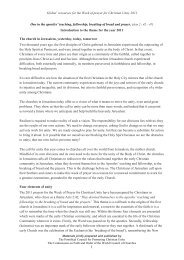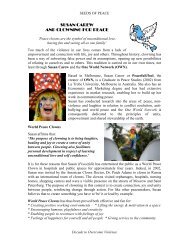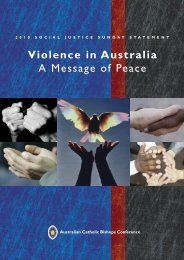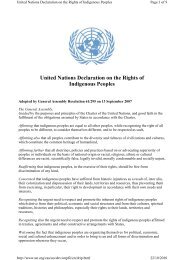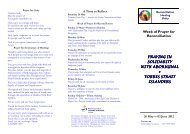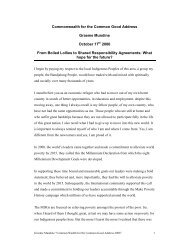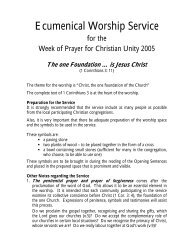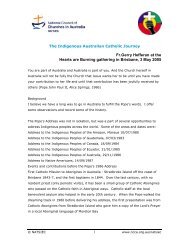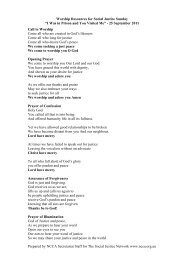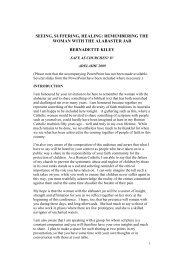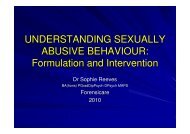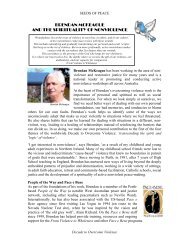Assessment of the service of Pope John Paul II - National Council of ...
Assessment of the service of Pope John Paul II - National Council of ...
Assessment of the service of Pope John Paul II - National Council of ...
- No tags were found...
Create successful ePaper yourself
Turn your PDF publications into a flip-book with our unique Google optimized e-Paper software.
<strong>Assessment</strong> <strong>of</strong> <strong>the</strong> <strong>service</strong> <strong>of</strong> <strong>Pope</strong> <strong>John</strong> <strong>Paul</strong> <strong>II</strong> by Rev Pr<strong>of</strong> James Haire,President, <strong>National</strong> <strong>Council</strong> <strong>of</strong> Churches in AustraliaI speak as one who has been Head <strong>of</strong> <strong>the</strong> Uniting Church in Australia, and alsoPresident <strong>of</strong> <strong>the</strong> <strong>National</strong> <strong>Council</strong> <strong>of</strong> Churches in Australia, but who has beenintimately involved with <strong>the</strong> Roman Catholic Church for over a decade as co-chair <strong>of</strong><strong>the</strong> <strong>National</strong> Dialogue between <strong>the</strong> Roman Catholic Church in Australia and <strong>the</strong>Uniting Church in Australia, and also as a member <strong>of</strong> <strong>the</strong> Joint InternationalCommission between <strong>the</strong> Roman Catholic Church and <strong>the</strong> World Methodist <strong>Council</strong>.Our most recent international meeting was held in Krakow, in Sou<strong>the</strong>rn Poland, where<strong>John</strong> <strong>Paul</strong> had been Archbishop and had been very friendly with <strong>the</strong> local Methodistminister. At that time, I travelled to many places around Krakow closely associatedwith his upbringing, including Czestochowa, <strong>the</strong> great shrine to <strong>the</strong> Virgin Mary,where <strong>the</strong> blood stained garment he was wearing at <strong>the</strong> time <strong>of</strong> <strong>the</strong> assassinationattempt is now placed. I also visited Auschwitz and many o<strong>the</strong>r places associated with<strong>the</strong> world from which he came.<strong>Pope</strong> <strong>John</strong> <strong>Paul</strong> <strong>II</strong>’s contribution to <strong>the</strong> entire human community has been enormous.First and foremost, it has been his presentation <strong>of</strong> a quite distinct way <strong>of</strong> looking at<strong>the</strong> world, which has stood in stark contrast to much <strong>of</strong> <strong>the</strong> materialism <strong>of</strong> our time.He has stood starkly against <strong>the</strong> ideologies <strong>of</strong> <strong>the</strong> Twentieth Century West. Theeffects <strong>of</strong> his critique <strong>of</strong> Nazism, and <strong>the</strong>n <strong>of</strong> Communism, are well known. There isno doubt that he stood at <strong>the</strong> very centre <strong>of</strong> <strong>the</strong> unravelling <strong>of</strong> <strong>the</strong> Soviet Empire.His close association with <strong>the</strong> Solidarity movement in Poland, and with Lech Walesabegan <strong>the</strong> process by which <strong>the</strong> entire Communist world was shaken and ultimately<strong>the</strong> system destroyed.However, that did not mean that he automatically allied himself with free marketCapitalism. He warned constantly <strong>of</strong> <strong>the</strong> dangers <strong>of</strong> rampant materialism. He upheld<strong>the</strong> dignity <strong>of</strong> working people. And he stood strongly over against <strong>the</strong> uncontrolledeffect <strong>of</strong> governments abandoning responsibility to <strong>the</strong> rule <strong>of</strong> market forces only.This was perhaps <strong>the</strong> most overt expression <strong>of</strong> <strong>the</strong> social ethics which was inspired byhis faith and his understanding <strong>of</strong> community. Central to all <strong>of</strong> this was his faith. Heaccurately expressed much <strong>of</strong> <strong>the</strong> self-understanding <strong>of</strong> his own Catholic faith. Hebelieved deeply in <strong>the</strong> dependence <strong>of</strong> all human life on <strong>the</strong> grace and providence <strong>of</strong>God.This faith was expressed in a number <strong>of</strong> ways. His immense energy was spent in <strong>the</strong>propagation <strong>of</strong> <strong>the</strong> faith around <strong>the</strong> world. In sheer numbers, <strong>the</strong> Catholic Churchgrew larger in his time than under any o<strong>the</strong>r previous <strong>Pope</strong>.He was socially progressive in relation to many issues, but highly conservative inrelation to doctrine and <strong>the</strong> expression <strong>of</strong> ministry and priesthood. This <strong>of</strong> course hadcome out <strong>of</strong> his own experience in Poland, where <strong>the</strong> discipline <strong>of</strong> <strong>the</strong> Church hadbeen central to <strong>the</strong> survival <strong>of</strong> <strong>the</strong> whole nation, against <strong>the</strong> ideologies <strong>of</strong> Nazism,Communism, and consumerism. In <strong>the</strong> document Dominus Iesus, which caused someconsternation among non-Roman Catholic churches, <strong>the</strong> central thrust in fact, was notabout relations with o<strong>the</strong>r Christian bodies, but about <strong>the</strong> problematic nature <strong>of</strong>relativism in much <strong>of</strong> Western culture. Here, he stood firm against what he saw as <strong>the</strong>
excessive individualism and decadent nature <strong>of</strong> much Western society. To that exten<strong>the</strong> was pr<strong>of</strong>oundly counter-culture in relation to <strong>the</strong> dominant social trends, and eveneconomic self-understanding, <strong>of</strong> <strong>the</strong> West. He also was critical <strong>of</strong> <strong>the</strong> Gulf Wars.With regards to ecumenism, very considerable moves forward were made, as seen in<strong>the</strong> document Ut Unim Sint. Specific moves towards reconciliation with Orthodoxchurches, <strong>the</strong> Anglican Communion, and Protestant Churches were made. There werelandmark events such as <strong>the</strong> historical signing <strong>of</strong> <strong>the</strong> Joint Declaration on Justificationwith <strong>the</strong> Lu<strong>the</strong>ran Church and <strong>the</strong> rapproachment with <strong>the</strong> Orthodox churches. Much<strong>of</strong> this involved <strong>the</strong> reinterpretation <strong>of</strong> <strong>the</strong> Catholic position in relation to o<strong>the</strong>rchurches, in language and gestures consistent with Catholic understanding but muchmore open and comprehensive than previously. Moreover, <strong>Pope</strong> <strong>John</strong> <strong>Paul</strong> <strong>II</strong> clearlyplaced <strong>the</strong> Catholic Church at <strong>the</strong> heart <strong>of</strong> <strong>the</strong> common search for Christian unity. Theinvolvement <strong>of</strong> <strong>the</strong> Catholic Church in <strong>the</strong> 5 th World Conference on Faith and Orderin Spain in 1993 (which I attended), showed a remarkable move to sharedresponsibility for Christian unity along with o<strong>the</strong>r churches, despite <strong>the</strong> frustrationsand <strong>the</strong> obstacles, for which <strong>the</strong> Catholic Church openly admits its joint responsibility.In <strong>the</strong> words <strong>of</strong> Cormack Murphy-O’Connor, <strong>the</strong> Cardinal Archbishop <strong>of</strong>Westminster, at <strong>the</strong> <strong>Pope</strong>’s funeral, <strong>the</strong> ecumenical movement now is road “fromwhich <strong>the</strong>re are no exits”.In relation to o<strong>the</strong>r faiths, <strong>John</strong> <strong>Paul</strong> made remarkable moves forward. The trauma <strong>of</strong><strong>the</strong> Holocaust surrounded him all his life. As any one who has walked along <strong>the</strong>dreadful paths <strong>of</strong> Auschwitz knows, <strong>the</strong> Showa impinges on <strong>the</strong> heart <strong>of</strong> anyone whohas experienced that place forever. <strong>John</strong> <strong>Paul</strong>’s whole life had been caught up in thistrauma. Jerzy Kluger, a Jewish childhood friend, said at <strong>the</strong> time <strong>of</strong> his death, “evenwhen he was a young boy, he would already show great concern for social equality,especially for <strong>the</strong> Jews. This was very important to him from an early age.”His visit to <strong>the</strong> synagogue in Rome marked <strong>the</strong> beginning <strong>of</strong> his moves towardsreconciliation with <strong>the</strong> Jewish people. He was <strong>the</strong> first <strong>Pope</strong> to do so.World Jewish Congress President, Edgar Bronfman, said “<strong>Pope</strong> <strong>John</strong> <strong>Paul</strong> <strong>the</strong> <strong>II</strong>fundamentally changed two thousand years <strong>of</strong> relations between <strong>the</strong> Church and <strong>the</strong>Jewish People. He reached across millennial divides to promote mutual respect andunderstanding.”Equally, his moves towards reconciliation with <strong>the</strong> Muslim world were remarkable.He opened channels <strong>of</strong> communication between Islam and <strong>the</strong> Vatican, being <strong>the</strong> first<strong>Pope</strong> in history to enter a Mosque, which he did in Syria in 2001. As Sheikh FehmiNaji <strong>of</strong> Melbourne said, “He was openminded and encouraged relationships between<strong>the</strong> various children <strong>of</strong> God on this earth, so we can live in this small village in peaceand harmony.”There were, <strong>of</strong> course, limitations to <strong>John</strong> <strong>Paul</strong>’s achievements, particularly in <strong>the</strong>understanding <strong>of</strong> urban Western Catholics, towards how <strong>the</strong> church should relate tocontemporary society. Ecumenism and inter-faith dialogue have advancedconsiderably, although o<strong>the</strong>rs would have wished that <strong>the</strong>y might have advancedfur<strong>the</strong>r. However, at <strong>the</strong> heart <strong>of</strong> all <strong>of</strong> this was his concern for human dignity and <strong>the</strong>place <strong>of</strong> people as children <strong>of</strong> God for whom <strong>the</strong>re was divine providence and a divineplan. The end <strong>of</strong> his own life expressed this concern perfectly. It was to be in God’shands, not in accordance with some human view <strong>of</strong> how life was to be defined. For all
who have suffered, for all in pain, for all with burdens, <strong>the</strong> end <strong>of</strong> his earthly life, asmuch as when he was in full health, was a model <strong>of</strong> discipleship and hope.



